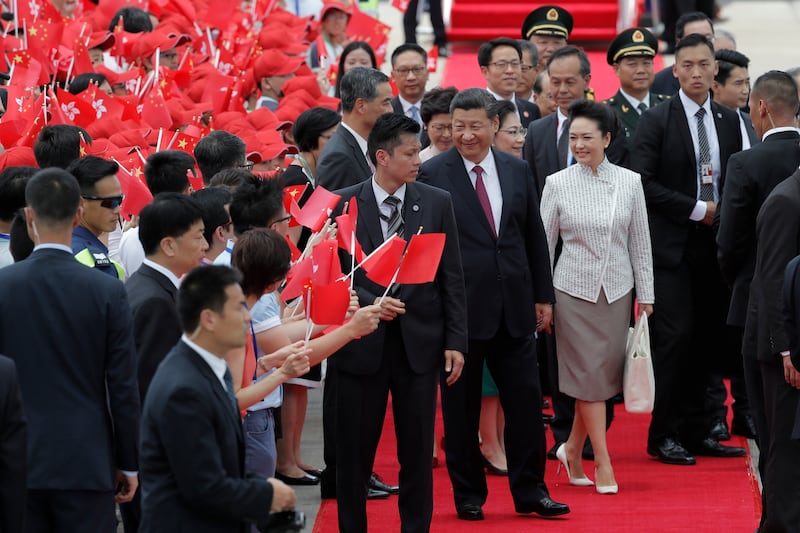HONG KONG // Chinese president Xi Jinping arrived in Hong Kong on Thursday to mark the 20th anniversary of the return of the former British colony to China, but protests began before his flight had even touched down.
This is the first presidential visit since pro-democracy activists shut down parts of the city in 2014, and comes at a time when China's commitment to the handover deal — which promised Hong Kong a "high degree of autonomy" until 2047 — is under scrutiny. More than two dozen pro-democracy activists have already been arrested, including Joshua Wong, who helped lead 2014's protests.
More protests are expected, including an annual march through the streets on Saturday that has drawn big crowds in the past.
The president's Air China plane touched down at midday for the three-day visit, which culminates on Saturday with Mr Xi presiding over an inauguration ceremony for Carrie Lam, Hong Kong's new leader.
"It's been nine years since I last set foot in this place. I'm thrilled. Hong Kong has been tugging away at my heart,," Mr Xi said on the airport tarmac.The anniversary of Hong Kong's "return to the motherland" on Saturday is "a big deal, a joyous occasion for the country and for Hong Kong," he added.
Hong Kong authorities were taking no chances with disruptions and deployed heavy security across the city. Helicopters hovered overhead and police and barricades lined the streets around a downtown convention centre and hotel complex where Mr Xi was expected to spend most of his time. Authorities even glued the gaps between paving stones, to prevent them from being torn up and thrown by protesters.
Britain ceded control of its colony to China at the stroke of midnight on June 30, 1997, and Mr Xi said one of the purposes of his visit was to plan for Hong Kong's future.
"We would like to look back at the 20 years of Hong Kong's extraordinary journey, learn from our experiences, and look forward to the future, to ensure the stable development of 'one country, two systems'," he said before speeding off in a motorcade without answering questions.
Under the "one country, two systems" principle, China took control of Hong Kong while promising to let it retain civil liberties such as freedom of speech and considerable autonomy from the mainland for a 50-year period. But some recent incidents, most notably the secret detention on the mainland of five Hong Kong booksellers, have stoked fears that Beijing is eroding that principle.
Three pro-democracy activist groups said 26 of their members were arrested on Wednesday evening on public nuisance charges for staging a sit-in at a giant flower sculpture near the complex being used as Mr Xi's base. They were still in custody by the time Mr Xi arrived. Those arrested included Joshua Wong, the young activist who helped lead 2014's "Umbrella Movement" protests, and Nathan Law, another student protest leader who was elected to the legislature last year.
* Associated Press





